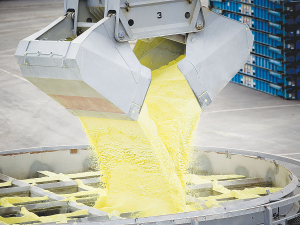Fonterra’s exit from Australia ‘a major event’
Fonterra’s impending exit from the Australian dairy industry is a major event but the story doesn’t change too much for farmers.
 Global fertiliser prices are expected to settle in 2024, despite uncertainty posed by the Israel-Hamas conflict.
Global fertiliser prices are expected to settle in 2024, despite uncertainty posed by the Israel-Hamas conflict.
After extreme market volatility and record-high prices in recent years, global fertiliser prices are expected to settle in 2024, despite uncertainty posed by the Israel-Hamas conflict as it currently stands.
That’s according to agri-banking specialist Rabobank’s just-released Semi Annual Fertiliser Outlook, titled What is Next? In it, Rabobank says while escalating tensions in the Middle East create some uncertainty in the outlook for fertiliser markets, the current impact for the food and agri sectors is manageable.
Report co-author, RaboResearch farm inputs analyst Vitor Pistoia says that, overall, farmers around the world may feel some negative impact due to potentially rising costs of energy and fertilisers. He adds this comes on top of slightly lower import demand and prices for grains and oilseeds due to the Israel- Hamas conflict.
However, Pistoia warns if the conflict spreads to the broader Middle East/North African (MENA) region, impacts on fertiliser supply – as well as grain, meat, and dairy demand – could be notable.
“If the conflict escalates to surrounding countries and one of these countries is Iran, and we have proper military movement from Iran versus Western countries, it can drive crude oil up to 160 USD (90.07 USD as of October 30th),” he told Rural News.
“Iran controls the Strait of Hormuz and if there is an escalation they will very likely close the strait so that can impact the surrounding countries i.e. Iraq, Saudi Arabia – that’s a large part of the oil supply.”
Israel exports 6% of the world’s potash and 8% of its phosphate fertilisers (2022 data), while the broader MENA region accounts for 30% of the world’s nitrogen fertiliser exports.
The region also accounts for more than 25% of global mixed fertiliser exports, 10% of potassic fertilisers and almost half of the phosphatic fertiliser exports. It remains to be seen how much of those trade volumes will be impacted in the coming months.
Pistoia says while 2024 is still some months away, this year has been a much calmer year for the fertiliser market and can be seen as a transition year, even with some remnants of all the market complications from 2022.
The bank’s models indicate a recovery in global fertiliser usage in 2023, up by around 3%, compared to the 7% drop in 2022, with an initial analysis suggesting an increase in global fertiliser use of close to 5% in 2024.
Pistoia said local fertiliser prices were significantly lower than a year ago, but this would not necessarily lead to increased fertiliser usage across New Zealand farms over coming months.
“Farm margins are incredibly tight across the majority of New Zealand farming businesses due to lower commodity prices and ongoing elevated costs for other farm inputs – like fuel and feed – as well as higher interest costs,” he adds.
“And a key question is how much the recent drop in the New Zealand dollar will offset the reduced cost of fertiliser in farmers’ budgets. When this lower dollar is combined with the recent crude oil hikes, how much is left in those budgets to increase fertiliser application rates?”
The Meat Industry Association of New Zealand (MIA) today announced that Chief Executive Officer Sirma Karapeeva has resigned from the role.
The winners of the 2026 Hawke’s Bay/Wairarapa Dairy Industry Awards were announced at the annual awards dinner held at Copthorne Solway Park in Masterton on Thursday evening.
Environment Southland is welcoming this week’s decision by the Environmental Protection Authority (EPA) to approve the release of Blaptea elguetai, a leaf‑feeding beetle that will help control the highly invasive Chilean flame creeper.
This March, the potato industry is proudly celebrating International Women’s Day on 8 March alongside the International Year of the Woman Farmer, recognising the vital role women play across every part of the sector — from paddocks and packhouses to research, leadership, and innovation.
Fruit trader Seeka posted a record profit and returns to shareholders in 2025.
Recent weather events in the Bay of Plenty, Gisborne/Tairawhiti, and Canterbury have been declared a medium-scale adverse event.

OPINION: A mate of yours truly reckons rural Manawatu families are the latest to suffer under what he calls the…
OPINION: If old Winston Peters thinks building trade relations with new nations, such as India, isn't a necessary investment in…